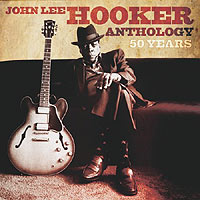John Lee Hooker, Anthology 50 Years
Published on March 30th, 2009 in: Issues, Music, Music Reviews, Retrovirus, Reviews |By J Howell
What can be said about John Lee Hooker that hasn’t been said at least a thousand times before? If you’re somehow unfamiliar with Hooker’s well-deserved “Blues Legend” status, this two-disc compilation isn’t a bad place to start. Hooker was notoriously prolific, recording multiple versions of songs over the years, sometimes under assumed names (but usually laughably close, such as “John Lee Booker”) to avoid contractual snags. Because of Hooker’s prodigious output on so many labels over so many years, assembling a perfect career summary set—especially on just two discs—would be nearly impossible. That said, Anthology 50 Years does a more than adequate, if not-quite-stellar, job of offering an overview of John Lee Hooker’s idiosyncratic style.

On the first disc, which covers Hooker’s work from 1948 through 1961, fans of Hooker’s more upbeat songs (or even more upbeat versions in some cases), won’t be disappointed. If you’re more inclined toward Hooker’s slower, simmering material from his earlier days, though, you might find this set wanting. Of course, there’s nothing bad here: John Lee Hooker was, more than some of his contemporaries, remarkably consistent; I’ve heard few—if any—missteps along the way. That said, this set seems to me just a little skewed toward the livelier, more house-party-ready Hooker. In all fairness, though, I would imagine that gaining access to every nook and cranny of the massive Hooker back catalog would be a nearly impenetrable labyrinth of clearances and legal wrangling, and might explain the absence of more of the slow-burning Hooker tracks I personally favor. There’s still plenty here of what makes John Lee Hooker who he was, though, and certainly enough to make for a solid introduction to Hooker’s early work, if not an encyclopedic representation of it.
There’s certainly enough of Hooker’s innate talent here to marvel at. Listening to him single-handedly do the work of an entire band is still revelatory, with him not only singing and playing guitar, but often tapping and stomping polyrythmically with his feet simultaneously. Hooker’s one-man-band ethic is especially amazing given the deceptive simplicity of his guitar work. While so much of what Hooker did has long since become somewhat standard in Blues, playing what he did the way he did it is maddeningly difficult. Try doing two different things on guitar while singing and tapping two different, intertwined beats with your feet, all the while sounding like it’s as natural as walking and chewing gum at the same time. . . I suppose that’s why there’s only ever been one John Lee Hooker.
It’s especially amazing to hear Hooker multitracked, as though there’s two or even three of him doing all that at once. Even more stupefying than that is figuring out how the hell Hook pulled that off in 1951, years before multitrack recording was available. To the best of my knowledge, Les Paul was still in the early experimental stages of multitrack recording in his garage then, and there were certainly no commercially available multitrack machines yet. In 1951, even stereo was still years away. . . but I digress. It is worth mentioning, though, how marvelous the sound of music the way it used to be recorded is, and there is plenty of that to revel in here.
Pages: 1 2
Time limit is exhausted. Please reload the CAPTCHA.